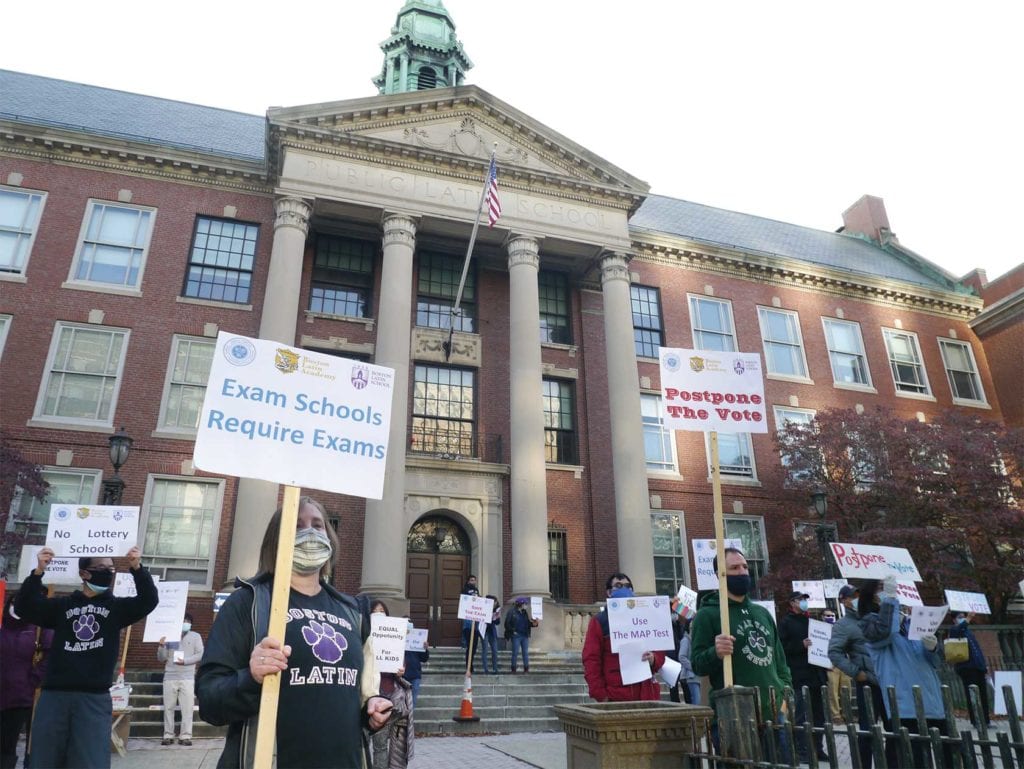
A federal judge ruled in favor of the Boston Public Schools’ one-year change to the admissions policy at its three selective admissions schools, denying a challenge to the policy from a group of white and Asian parents.
The policy, which the Boston School Committee adopted for the current year, drops the use of a standardized test as a factor in admissions, prioritizing instead students with the highest grade-point averages and students in zip codes with high percentages of low-income families.
While BPS officials maintained that the policy was necessary this year, as holding the exam during the ongoing pandemic was not safe, the Boston Parent Coalition for Academic Excellence Corp. in February filed a lawsuit seeking to block the policy, arguing that the district was using zip codes as a proxy for race.
A coalition of Black, Latino and Asian groups filed a brief in support of the policy.
With white and Asian students overrepresented in the city’s three selective-admissions schools, the one-year change was widely seen as a way to broaden the racial and socio-economic diversity in the schools. NAACP Boston Branch President Tanisha Sullivan said the ruling by Judge William Young affirms the legal soundness of the district’s race-neutral strategy to open the schools to a more diverse pool of students.
“This is, indeed, a historic moment that will surely have national implications,” said Sullivan. “It is celebrated this morning across the country by those of us who have been in this fight for educational equity.”
Sullivan and other attorneys in a coalition of Black, Latino and Asian activists who intervened in the lawsuit on the side of the school district spoke in a Zoom call on the significance of the decision.
Boston’s exam schools admitted students by teacher recommendation until 1963, when the district instituted an entrance exam that was put together by district officials. In his ruling on the 1975 school desegregation lawsuit, Judge Arthur Garrity instituted a 35% set-aside of seats in the exam schools for Black and Latino students.
That policy stayed in place beyond the expiration of Garrity’s order in 1989, but it did not survive a legal challenge from a white parent in 1996. In 1998, the district ceased to use race as a factor in admission to the schools.
While Latinos represent 42% of the district overall, they make up just 13% of the student body at Boston Latin School, the largest and best-endowed of the city’s selective admissions schools. Blacks make up 29% of the student body in the district, but just 7.7% of students at Boston Latin School.
Sullivan’s reference to the ruling’s national significance underscores what she sees as the efficacy of the policy in ensuring greater diversity in a school whose student body has long been dominated by students from higher-income white and Asian families. While 19% of Boston Latin School’s student body is economically disadvantaged, district-wide that figure is 63%.
While the law does not allow for race-specific admissions policies, race and other types of diversity can be considered. Young’s ruling affirms the district’s use of zip codes to ensure geographic diversity, a strategy that will also ensure greater racial diversity, given the city’s segregated housing patterns. Zip codes with higher numbers of school-age children will be afforded more seats, according to the district’s policy.
“The decision explicitly states that diversity can be considered without tipping the scale to a strict scrutiny review by the reviewing court,” said Doreen Rachal, an attorney with the firm Sidley, who argued on behalf of the Black, Latino and Asian activists who intervened in the lawsuit.
Lawyers for Civil Rights Executive Director Ivan Espinoza Madrigal called the decision historic.
“This will set a strong precedent that racial justice interventions in education and other arenas are perfectly constitutionally permissible and that they should be actively explored to make sure that we can resolve issues related to our caste system,” he said. “This will be a major case, whether or not it goes to the Supreme Court.”
BPS officials have indicated that by the end of April, they will begin offering students admitted through the interim assignment system seats at the selective-admissions schools.
The Boston Parent Coalition for Academic Excellence Corp. last week filed an appeal of the ruling.
“We respectfully disagree with the court’s decision, and we are going to appeal,” members of the group said in a statement sent to news media. “We will make details available as the case progresses.”
Sullivan noted that the interim admissions policy was designed by a group that includes parents, educators and community stakeholders who worked to design a system that provides opportunity for all of the city’s children.
“We need more community-driven solutions that speak to the needs of our community,” she said.
Asked whether the policy would likely withstand a court challenge if it stands for more than the one year of the pandemic, Sullivan noted that the Boston School Committee agreed to establish a task force to review the interim policy and make recommendations on a permanent policy. Sullivan, who serves on the task force, said the legal decision will serve as guidance for a more permanent process.
“The interim policy does something that has never been done before in the city of Boston,” she said. “It intentionally creates the opportunity for children across the city to be able to access these highly selective schools. It will increase geographic diversity, neighborhood diversity. That’s never been done before.”







